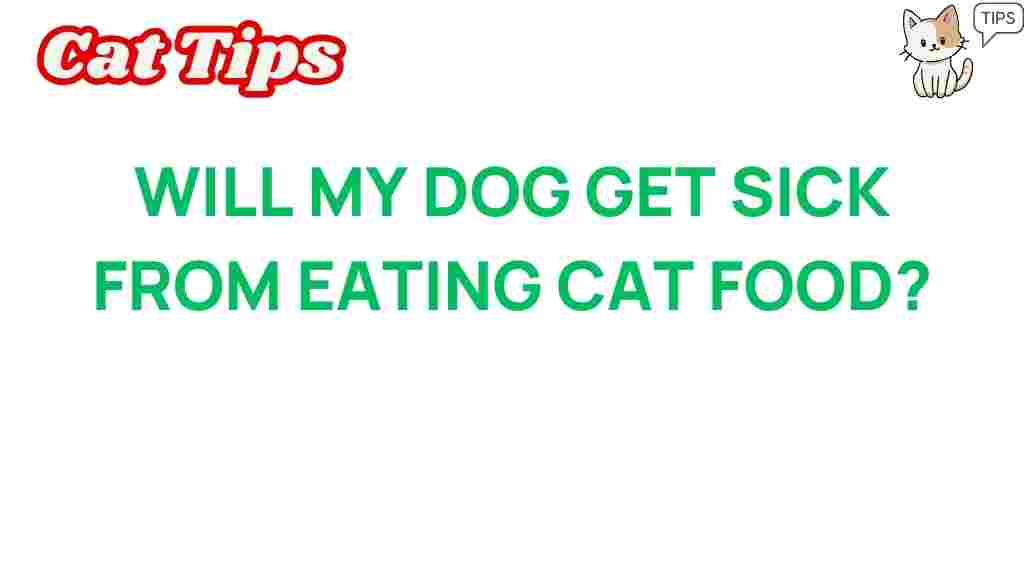Can Your Dog Safely Snack on Cat Food? Understanding the Impact on Dog Health
As pet owners, we often find ourselves questioning the diets of our furry friends. One common scenario is when a dog sneaks a snack from the cat’s food bowl. While this may seem harmless, it’s essential to consider the implications for dog health. In this article, we’ll explore whether it’s safe for dogs to consume cat food, what potential risks are involved, and how you can ensure your dog maintains a healthy diet.
Why Dogs Might Eat Cat Food
Dogs are naturally curious creatures, and their instincts often lead them to explore and taste different foods. Here are some reasons why your dog might find cat food appealing:
- Protein Content: Cat food typically has a higher protein content than dog food, making it more enticing to dogs.
- Fat Content: The fat content in cat food is generally higher, which can be attractive to dogs who crave rich flavors.
- Smell: The aroma of cat food can be appealing, stimulating your dog’s appetite.
The Nutritional Differences Between Dog Food and Cat Food
Understanding the nutritional composition of both dog food and cat food is crucial for assessing the impact on dog health:
- Protein: Cats require more protein than dogs due to their obligate carnivore status. Dog food is formulated to meet a dog’s specific protein needs, which are lower than those of cats.
- Fat: Cat food often contains higher fat levels, which can lead to obesity and pancreatitis in dogs if consumed regularly.
- Vitamins and Minerals: Cat food is fortified with nutrients essential for cats but may not be suitable for dogs, potentially leading to imbalances.
Is Occasional Snacking on Cat Food Safe for Dogs?
While an occasional nibble of cat food may not be harmful to your dog, regular consumption can lead to several health issues. Here are some points to consider:
- Digestive Upset: A sudden change in diet can cause gastrointestinal upset, including diarrhea and vomiting.
- Weight Gain: Due to the higher calorie content, frequent snacking on cat food can lead to weight gain.
- Nutrition Imbalance: Long-term consumption may result in nutrient deficiencies or excesses, affecting overall dog health.
What to Do If Your Dog Eats Cat Food
If your dog has snacked on cat food, it’s essential to monitor them for any adverse reactions. Here’s a step-by-step guide on what to do:
- Observe: Watch for signs of distress such as vomiting, diarrhea, or lethargy.
- Hydrate: Ensure your dog has access to fresh water to prevent dehydration.
- Consult Your Vet: If your dog shows any concerning symptoms, contact your veterinarian for advice.
Preventing Your Dog from Eating Cat Food
To protect your dog’s health, here are some effective strategies to prevent them from snacking on cat food:
- Feeding Schedule: Establish a strict feeding schedule for both pets to minimize the chances of one eating the other’s food.
- Separate Feeding Areas: Feed your cat in a separate room or area that is inaccessible to your dog.
- Use Elevated Bowls: Consider using elevated bowls for your cat, making it harder for your dog to reach.
What If Your Dog Shows Signs of Illness?
If your dog displays any signs of illness after consuming cat food, it’s crucial to act quickly. Here are some common symptoms to watch for:
- Vomiting
- Diarrhea
- Loss of Appetite
- Lethargy
- Abdominal Pain
If you notice any of these symptoms, contact your veterinarian immediately. They may recommend a visit for further examination and treatment.
Long-term Effects of Regularly Eating Cat Food
Regularly snacking on cat food can have several long-term effects on dog health:
- Obesity: Increased calorie intake from cat food can lead to weight gain and obesity.
- Pancreatitis: High fat content can cause pancreatitis, a painful condition requiring medical attention.
- Nutritional Deficiencies: A diet lacking in essential nutrients can lead to deficiencies over time.
Can Dogs Eat Cat Food in Emergencies?
In an emergency situation where dog food is unavailable, a small amount of cat food can serve as a temporary solution. However, it should never replace a balanced diet. Here’s what to keep in mind:
- Short-term Use: Use cat food only as a temporary measure until you can provide proper dog food.
- Monitor Intake: Limit the amount to prevent any adverse effects on dog health.
Conclusion: Prioritize Your Dog’s Health
While the occasional snack of cat food may not pose immediate dangers, it can lead to serious long-term health issues for your dog. Understanding the nutritional differences and potential risks is vital for ensuring your dog’s health and well-being.
As a responsible pet owner, it’s essential to provide a balanced diet tailored to your dog’s specific needs. If you have any concerns about your dog’s dietary habits or health, make sure to consult with your veterinarian.
For more information on pet nutrition and health, check out this comprehensive guide. And remember, keeping both your dog and cat’s feeding habits separate is the best way to ensure a happy and healthy household.
For additional tips on promoting dog health, visit this reliable resource.
This article is in the category Nutrition and created by CatTips Team
